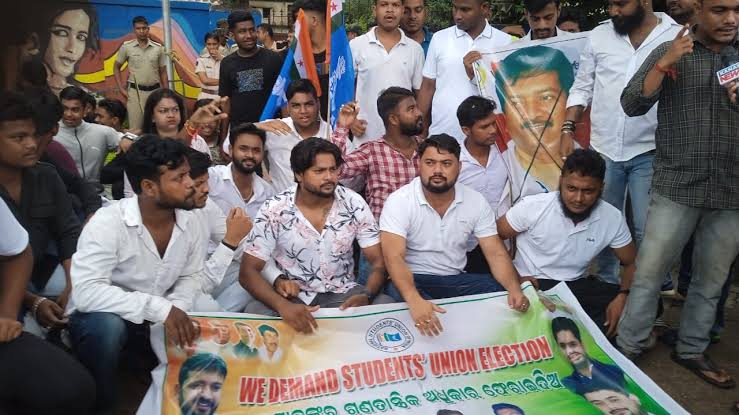Unlawful Postponement of College and University Student Elections: A Breach of Democracy in Odisha
Bhubaneswar,(KCN) : Institutions of higher education are not only hubs of academic learning but also fertile grounds for nurturing democratic values. Central to this democratic ethos are student elections, which empower the youth to engage in governance and decision-making processes within their campuses. However, recent events have raised concerns about the unlawful postponement of college and university student elections, undermining the very principles of democracy and student representation.
Student elections are a cornerstone of democratic participation within educational institutions. They provide students with the opportunity to elect their representatives who voice their concerns, advocate for their interests, and foster a sense of belonging and community on campus. These elections also serve as valuable training grounds for future leaders, helping them develop leadership skills, public speaking abilities, and a sense of responsibility.
In recent years, instances of student elections being unlawfully postponed or canceled have been on the rise in Odisha. Such actions, often carried out by college and university administrations, deprive students of their democratic rights and stifle their ability to shape the future of their institutions. This trend is deeply concerning for several reasons:
Delaying or canceling elections robs students of their right to choose representatives who can articulate their needs and concerns. This suppression undermines the principles of democracy and civic engagement.
Student representatives play a crucial role in holding administrations accountable for their actions. Without elected leaders, transparency and accountability suffer, potentially leading to unchecked power within the institution. Student elections provide invaluable learning experiences. Postponing or canceling them deprives students of the opportunity to develop essential skills like leadership, negotiation, and diplomacy.
The unlawful postponement of college and university student elections is a threat to the democratic fabric of educational institutions. It stifles the voices of the youth and undermines the principles of democracy, transparency, and accountability that these institutions should uphold. It is imperative that stakeholders, including students, faculty, and administrators, work together to ensure that student elections are conducted in a manner that reflects the true spirit of democracy and empowers the leaders of tomorrow.
Student elections, often the breeding ground for future political leaders, have been conspicuously postponed from the Odisha educational landscape since 2018. While the pandemic offered a reasonable excuse for the cancellation of elections in 2020 and 2021, the lack of a plausible justification for the absence of elections in 2022 is deeply troubling. This hiatus threatens to extinguish the aspirations of nurturing the next generation of leaders within the hallowed halls of academia.
Conscientious citizens and intellectuals have been vocal in their condemnation of the government’s decision, rightfully asserting that it infringes upon the constitutional rights of students. Various student associations have taken to the streets in protest, their voices echoing the urgent need for democracy within educational institutions. However, the response from the government has been one of indifference, with the administration and educational authorities maintaining a conspicuous silence.
Corruption within educational institutions has reached alarming levels, exacerbated by the absence of elected representatives to combat it. This vacuum in leadership appears to be a calculated maneuver to weaken the student union, leaving numerous teaching and non-teaching positions vacant. The consequence has been a surge in violence and drug-related issues within campus boundaries. In the midst of this chaos, students are left in search of their advocates, those voices that should be championing their cause.
On the contrary, the argument put forth by the Biju Students’ Union, claiming that elections disrupt the academic atmosphere, falls short of addressing the critical need for student representation and leadership within educational institutions. This reasoning fails to acknowledge the fundamental role of student politics in voicing concerns and safeguarding students’ rights.
As this deadlock persists, the future of student politics in Odisha remains hanging in the balance. Students, desperate for their rightful representatives, are left in a state of limbo. The government’s inexplicable decision to indefinitely postpone student elections raises pressing questions about the preservation of democracy within educational institutions and the nurturing of future leaders within the state. This critical issue demands immediate attention and resolution for the sake of Odisha’s academic and democratic integrity.

